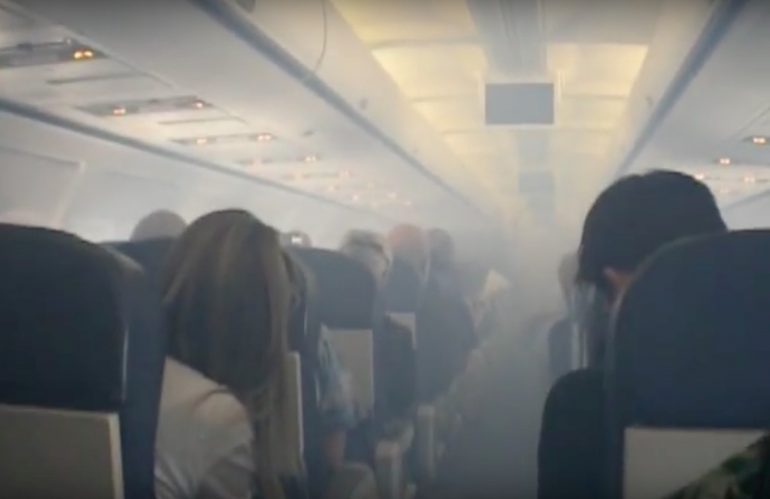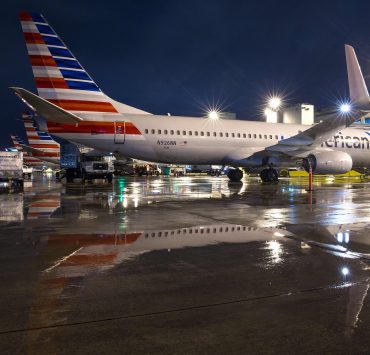
The largest union representing cabin crew in the United Kingdom and Ireland has started legal action against five British airlines in 51 different cases involving so-called ‘toxic’ fume events. The Unite union claims that independent expert evidence has found that the cabin air that passengers and crew breath in on most commercial planes “can cause irreversible neurological damage and chronic illness.”
Pilots and cabin crew are said to be much more susceptible to developing what has become know as ‘aerotoxic syndrome’ not only because of the amount of time they spend in an aircraft cabin but because they are a lot more active than passengers, including frequent flyers.
The union has backed expert medical evidence which has shown that pilots and cabin crew can develop aerotoxic syndrome either from a high-dose toxic fume event or from long-term exposure to ‘normal’ cabin air. The issue arises because cabin air is supplied from unfiltered ‘bleed air’ which comes directly from the aircraft engines.
Researchers say this bleed air is susceptible to becoming contaminated with toxic compounds such as organophosphates and TCP that come from engine oil and industrial lubricants. The only aircraft that doesn’t currently use bleed air to pressurise and supply air to the cabin is the Boeing 787 Dreamliner.
The London-based Aerotoxic Association says it has been contacted by more than 2,500 potential victims who claim to have suffered serious health problems that may be associated with toxic cabin air. Captain John Hoyte, who is the chairman of the Aerotoxic Associations says thousands of crew members are likely to be affected every year.
Hoyte was forced to retire early from his career after suffering life-changing symptoms which he claims was caused by Aerotoxic Syndrome. He was one of 27 pilots who was tested by University College London during a study into the condition – all 27 volunteers showed evidence of toxic poisoning according to Hoyte.
The 51 court cases backed by the Unite Union involve both pilots and cabin crew working for easyJet, British Airways, Thomas Cook, Jet2 and Virgin Atlantic. The BBC reports that the majority of cases have been brought against British Airways.
“Independent expert evidence concludes that air onboard jet planes can contain a toxic mix of chemicals and compounds that potentially damage the nervous system and may lead to chronic irreversible health problems in susceptible individuals,” explains Unite’s assistant general secretary for legal services, Howard Beckett.
“The airline industry cannot continue to hide from the issue of toxic cabin air whilst placing the health and safety of aircrew at risk… how many more must be put at risk before the airline industry cleans its act up?”
Unite is calling on airlines to take immediate steps to reduce the risk of toxic cabin air including using safer engine oils, installing air filters, better monitoring of cabin air and investing in aircraft that don’t use a bleed air system. So far, only British low-cost carrier, easyJet and U.S.-based ULCC Spirit have said they will fit bleed air filters to their existing aircraft fleet.
Many airlines maintain that fume events or what they prefer to call ‘smell events’ may cause some short-term irritation but do not pose any longterm ill health issues. British Airways has previously said that it would never operate a flight if it thought the safety or its passengers or crew were at risk.
“The safety of our customers and crew is always our priority and we would never operate an aircraft if we believed it posed a health or safety risk,” a spokesperson explained.
“Substantial research into cabin air quality has not shown any link to long-term ill health. We will continue to keep across the objective scientific information available.”
Mateusz Maszczynski honed his skills as an international flight attendant at the most prominent airline in the Middle East and has been flying throughout the COVID-19 pandemic for a well-known European airline. Matt is passionate about the aviation industry and has become an expert in passenger experience and human-centric stories. Always keeping an ear close to the ground, Matt's industry insights, analysis and news coverage is frequently relied upon by some of the biggest names in journalism.









